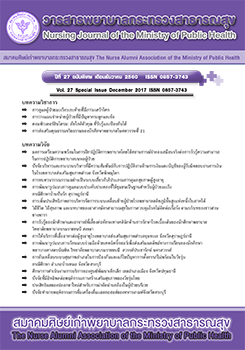Development of Jigsaw Cooperative Learning Technique to Enhance Learning Outcomes of Nursing Students Undertaking Bachelorof Nursing Science Program Boromarajonani College of Nursing, Sawanpracharak Nakhonsawan
Main Article Content
Abstract
This research and development study aimed to 1) develop a jigsaw cooperative learning technique in the subject of ‘Nursing care of persons with health problems I and 2) investigate the effects of the jigsaw cooperative learning pattern on learning outcomes of nursing students. The study comprised three steps including 1) analyzing existing teaching practices; 2) developing a learning technique to counter any problems identified from the findings of the first step; 3) implementing and testing the new learning technique by comparison with the traditional teaching method on academic achievement and teamwork skills. Jigsaw, a cooperative learning technique, was selected to be evaluated in this area of study. The quasi-experimental with two groups pretest-posttest design was used in this step.
Eight nursing instructors who taught the topic of nursing care of persons with alterations in gastrointestinal function were interviewed. A convenient random sampling technique was used to select 12 out of 135 junior nursing students to be interviewed to identify the pedagogical situations. The sophomore students were selected for the sample of the intervention and randomly assigned into two groups: an experimental group (n = 35) and a control group (n =34) in the third step to evaluate the effectiveness of this teaching pattern. The research instruments used in step 1 were a questionnaire and semi-structured interviews. The third step used the academic test score and the teamwork skill score to evaluate the effectiveness of the jigsaw technique.
The findings revealed that there was a pedagogical problem at a moderate level. Students wanted a variety of teaching methods. The developed jigsaw cooperative learning consisted of four components: the preparation for teaching; the allocation of the group members; the actual teaching; and the evaluation. There was a statistical difference in favor of the experimental group on the academic test score at p=.05. The teamwork skill score after being taught using the jigsaw technique was significantly higher than those of before at p=.005.
Article Details
บทความและรายงานวิจัยในวารสารพยาบาลกระทรวงสาธารณสุข เป็นความคิดเห็นของ ผู้เขียน มิใช่ของคณะผู้จัดทำ และมิใช่ความรับผิดชอบของสมาคมศิษย์เก่าพยาบาลกระทรวงสาธารณสุข ซึ่งสามารถนำไปอ้างอิงได้
References
2. Tongnuang P. Effects of students centered teaching modules on learner knowledge and learner developments in pathophysiology subject among nursing students. Princess of Naradhiwas University Journal 2010;2(1):73-89.(in Thai)
3. Johnson DW, Johnson RT, Smith KA. Active learning: Cooperation in the college classroom. Edina, MN: Interaction Book Company;1991.
4. Johnson DW, Johnson R. Learning together and alone: Cooperative, competitive, and individualistic learning. Boston: Allyn & Bacon;1999.
5. Phongnara S. The Effects of the cooperative learning with jigsaw technique on logic and goal oriented thinking skill and learning achievement in the topic of dhamma principles of Mathayom suksa I students at Prot Pittayapayat School in Bangkok Metropolis [Master thesis]. Nonthaburi: Sukhothai Thammathirat Open University. 2010.(in Thai)
6. Kusolchalermwit T, Meeklang P. Learning development on Thai economy by using jigsaw cooperative learning technique of social studies, religion and culture learning substance group of Mathayom suksa 1 students. Graduate Studies Journal 2013;10(48): 154-60.(in Thai)
7. Kamchan N. Jigsaw Cooperative learning on qualitative system of educational quality assurance for second year students Institute of Physical Education Phetchabun Campus. Research Report. Faculty of Education; 2014. (in Thai)
8. Buhr GT, Heflin MT, White HK, Pinheiro SO. Using the jigsaw cooperative learning method to teach medical students about long-term and postacute care. J Am Med Dir Assoc 2014;15 (6):429-34. doi: 10.1016/j.jamda.2014.01.015.
9. Unhasuthiyanonth A. Relationship among transformational leadership of head nurses, teamwork and effectiveness of the department of general hospital in the region 6 and 7 [Master thesis]. Nonthaburi: Sukhothai Thammathirat Open University. 2008.(in Thai)
10. Roming DA. Breakthrough teamwork:Outstanding results using structured teamwork. Chicago,I:Irwin;1996.
11. Suratruengchai V, Tubsri C, Sukpredee L, Yamkasikorn M, Visetsuwan A, Muangmee S, et al. The Current instructional practices and problems of providing instruction of instructors at Burapha University. Journal of Education 2006;17(2):105-18.(in Thai)
12. Thongpan Boonkusol T, Chindanurak T, Puttapitukpol S, Lausuwanakul W. The efffectiveness of instructional model to enhance the knowledge transfer and task ability of nursing students. Journal of the Royal Thai Army Nurses 2012;13(2):28-37.(in Thai)
13. The Ministry of Education. The National Education Act of B.E. 1999 and amendment (No.2) 2002. Bangkok: Shipping and Packing Organization; 2002.(in Thai)
14. Bratt C. The Jigsaw classroom under test: No effect on intergroup relations evident. J Community Appl Soc Psychol 2008;18:403–19. doi: 10.1002/casp.946.
15. Tarhan L, Ayyıldız Y, Ogunc A, Sesen BA. A jigsaw cooperative learning application in elementary science and technology lessons:Physical and chemical changes. Res Sci & Tech Edu 2013;31(2):184–203.
16. Sanguanrat S. A study of using jigsaw teaching method for the development of knowledge and understanding of EDCI201 learning design. Journal of Graduate Studies in Northern Rajabhat Universities 2015;5(Suppl. July):1-18.(in Thai)
17. Thaotho S. The effects of using jigsaw model on learning achievement in curriculum development subject of ndergraduate students at Nakhon Phanom University. Proceedings of the National Management for Local Development towards ASEAN Community : New Direction in the 21 Century; 2016 July 28; Kalasin University. Kalasin Province: 2016. p. 1119-28. (in Thai)
18. Panjamawat A. Development of learning activities to promote teamwork skill using learning together cooperative learning for Matthayomsuksa 1 students, Don Mueng Thaharnakatbumrung in occupational work and technology subject. Research Report Kasetsart University, Bangkhen Campus. Bangkok: 2013. (in Thai)
19. Anuntasuk N, Aiumkaew P. The effects of cooperative learning with jigsaw II technique on history achievement and cooperative working ability of Mattayomsuksa 2 students. Proceedings of the 6th Academic Meeting National and International Conference; 2015 April 28-29; Suan Sunandha Rajabhat University. Bangkok:2015. p.190-200.(in Thai)
20. Witoonmetha M, Pakdeewong N. Effects of cooperative learning on academic achievement and teamwork behavior in fundamental nursing of nursing students. Journal of Rangsit University : Teaching & Learning 2010;4:18-28. (in Thai)

